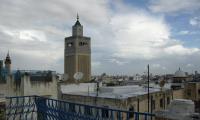Tunisia

The Danish Institute for Human Rights works towards a collaborative and effective national human rights system in Tunisia.
Our main objective is to contribute to a well-functioning national human rights system and to the development of state structures and mechanisms which protect, respect, and fulfil human rights.
We support inclusive reporting on human rights to the international and regional treaty bodies and the UPR system (Universal Periodic Review). We also support independent human rights actors, such as the national human rights institution and the independent public instances, as well as promote exchanges between state actors with a human rights mandate.
Why?
Tunisia's national human rights system has undergone various changes since the "Arab Spring" in 2011. With the adoption of the 2014 constitution, which foresaw a new system, new independent public instances were established to protect and monitor human rights in Tunisia alongside governmental actors with a human rights mandate.
How we work
The Danish Institute for Human Rights has worked with partners in Tunisia and built long-term partnerships by engaging with national human rights actors such as key state and governmental institutions.
We:
- Support national human rights institutions to function in accordance with the Paris Principles and actively promote and protect human rights.
- Support governmental human rights focal points in fulfilling their mandates, with regard to international obligations and national human rights agendas.
- Support partners to engage in an inclusive process when preparing their human rights reports, among others through consultations with civil society, youth, and women.
- Promote peer exchanges and networking for mutual learning in the Middle East and North Africa and in Denmark.
- Generate knowledge and raise awareness of human rights.
Enhancing human rights through partnerships with duty-bearers
The Danish Institute for Human Rights is engaged in two projects: The Human Rights and Inclusion Consortium and the Accountability and Human Rights Consortium or TRUST project.
The Consortium for Human Rights and Inclusion
The Danish Institute for Human Rights is working in a Human Rights and Inclusion Consortium (2022-2027), funded by the Danish-Arab Partnership Programme.
In collaboration with its strategic partners, the Danish Institute for Human Rights works for human rights through partnerships with national human rights actors, such as state and governmental institutions.
In Tunisia, we mainly work with governmental human rights focal points and the Higher Committee for Human Rights and Fundamental Liberties (the national human rights institution).
The TRUST Project
Since September 2020, the Danish Institute for Human Rights has been engaged in a joint project entitled Transition redevable pour la societe tunisienne, in short TRUST, funded by the Swiss Agency for Development and Cooperation.
This project explores the accountability of the Tunisian state through the mandate and role of independent public instances.
TRUST is a consortium-based project, led by the Danish Institute for Human Rights, with Dignity and EuroMedRights as members and KADEM as implementing partner.
The project focuses on strengthening the capacities of independent public instances in the exercise of their mandate. This includes their interactions with all actors (state and civil society) for the protection and promotion of human rights and the guarantee of state accountability. It also supports the synergies between the independent public instances in order for them to address common challenges.
Read more about the project here: TRUST - Accountable Transition for Tunisian Society
Partners
- Le Comité supérieur des Droits de l’Homme et des Libertés Fondamentales (national human rights institution)
- Governmental human rights focal points
- The League of Independent National Instances (LINI)
- L’Instance supérieure indépendante pour les élections (ISIE)
- L’Instance nationale de lutte contre la corruption (INLUCC)
- La Haute autorité indépendante de la communication audiovisuelle (HAICA)
- L’Instance nationale pour la prévention de la torture (INPT)
- L’Instance nationale d’accès à l'information (INAI)
- L’Instance nationale de protection des données à caractère personnel (INPDCP)
- L’Instance nationale de lutte contre la traite des personnes (INLTP).
UN recommendations
The United Nations monitors the human rights situation in all countries and experts and member states give recommendations to individual governments. Read the UN recommendations to Tunisia here.
